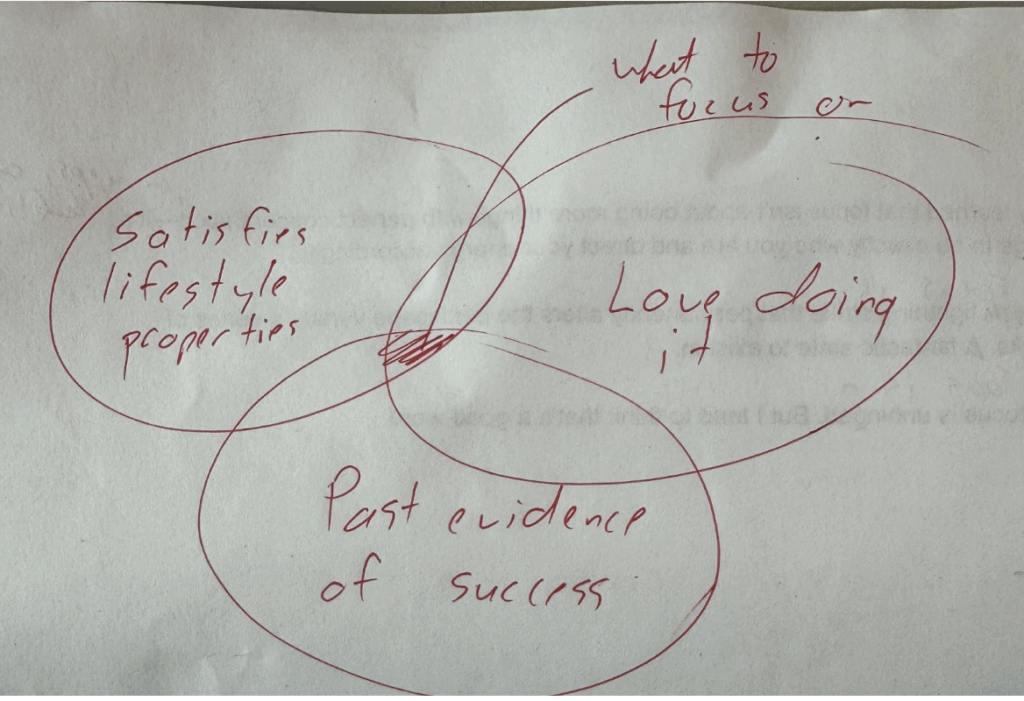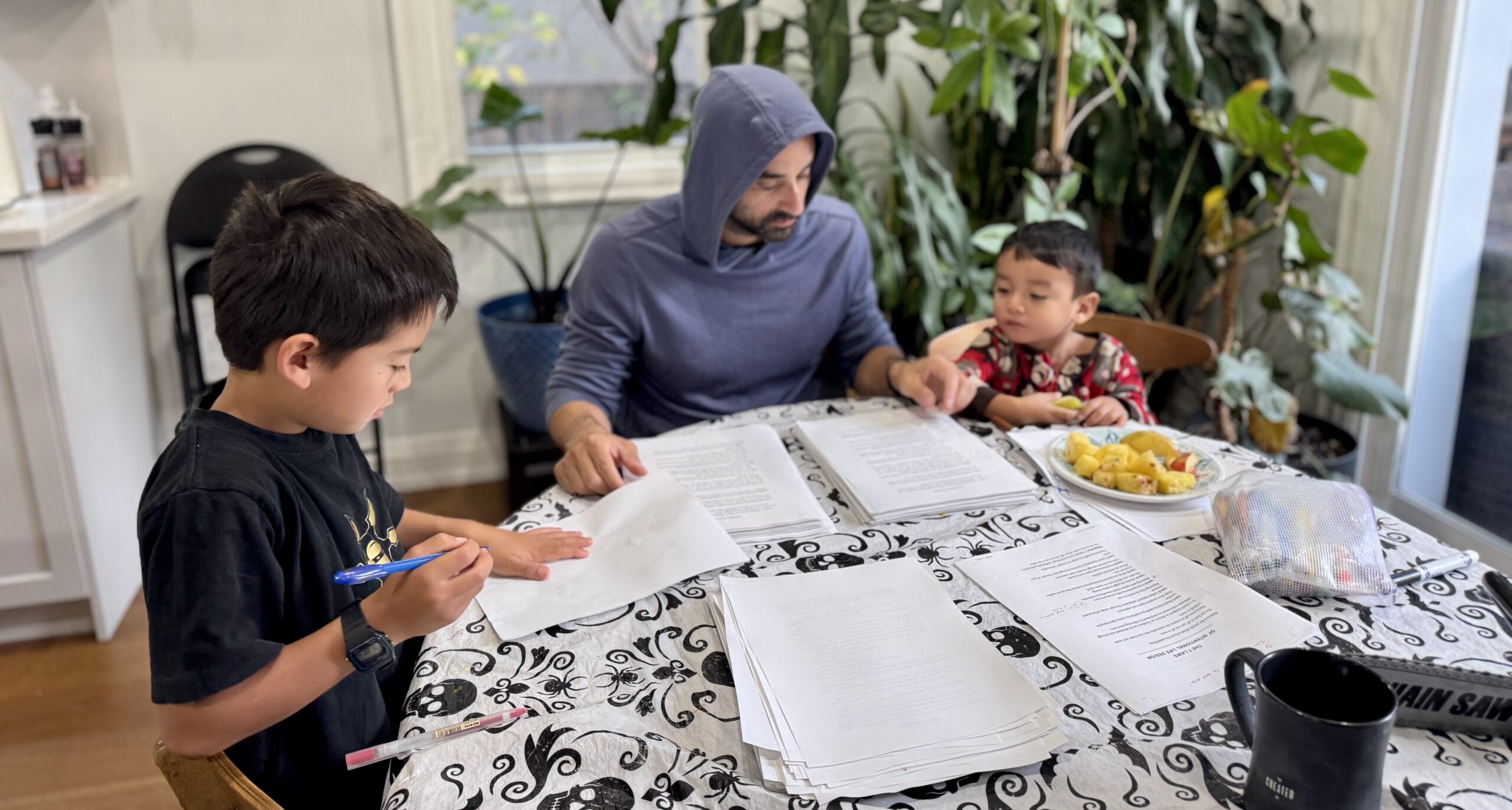It’s my 40th birthday.
In four decades, focus is the most important concept I’ve learned that I’m finally embracing.
Focus isn’t a technique. It’s a state that you exist in.
The hardest part about focus is accepting its tradeoffs:
- The short-term sacrifice.
- The guilt of neglecting priorities.
- The nagging pull of thinking others have figured it out.
Too much time is a problem.
It’s hard to focus without constraints. You’re not forced to prioritize. You can say yes to things, so you do. I think this is why people with families tend to achieve more professionally. Which is counterintuitive.
I’ll be honest with you: I’m tired. My kids don’t sleep well. My brain has maybe one good hour of attention most days. That’s low-grade sleep deprivation, or early-stage parenting, for you.
And so, for this season of my life, I do not work much. I can’t.
And yet, despite being unable to focus on any task for extended periods of time this year, I’ve had more professional growth (and income growth) than ever.
Part of it is surely the result of 15 years in one field—the simple compounding of experience over time. But I think there's more to it. I think it's because I finally learned that focus isn't about sitting in silence with noise-cancelling headphones for hours on end, matcha tea, or productivity apps. No, it’s deeper than that.
Focus is a state you exist in when you finally become confident in who you are. When you say “this is who I am. These are the people I want to be around. This is the work I am best designed to do, dammit, and it’s all I’m doing.”
Redefining focus this last year transformed my work. It’s guided me to choose writing as my path. And it has attracted the right opportunities and people to me.
You are not your job. Let’s start there.
I was listening to a podcast from Cal Newport yesterday on a short run. The run was short because I don’t have much time to run. Which is fine. Running sucks. I don’t want my heart to explode so I do it. A few miles is enough.
Anyway, Cal said that our working memory can only hold so many things. And if we try to make it hold too many, they blend together into an amorphous blob of what needs to be done. This puts you in a mindset of “I’m behind on things. I’m a mess.” When you’re in that mindset, Newport said, “it’s hard to make progress”.
A question I’ve always asked is:
“What’s the difference between people who work hard and succeed and people who work just as hard, yet toil and sputter and burn out?”
It’s clearly not effort.
After 40 years, I think I found the answer.
The most successful people exist in a state of focus.
Try to do too much and you’ll accomplish nothing. At least, it’ll feel that way. Progress will be unrecognizable. When you’re directionless, momentum is impossible to delineate.
The catalytic point for me was when I wrote down my ideal lifestyle properties.
I realized that most people define themselves by their job. I’m a personal trainer. An author. A software business owner. Whatever.
You become trapped when your self-identity is wrapped up in your job.
When deciding what to focus on, begin with the lifestyle properties you desire.
My goal for this (very busy, exhausted, and absolutely positively amazing) season of my life with young children is to put in a few focused hours of work each day. No more than two or three. To read lots, meet interesting people, and be able to disappear for a month at a time and have nobody care.
More than one job satisfied my lifestyle properties. And even if I don’t get there 100%, which I won’t, having it written out helps me make hard decisions.
Once I defined my lifestyle properties, writing emerged as the perfect fit for my constraints. And I love doing it. With limited daily capacity, I needed work that could thrive in concentrated bursts.
I’m going to talk about writing books now. But only as an example of the power of living in a state of focus.
Focusing on writing was not financially motivated. It’s because I’m a young dad. For this season, all I can muster is an hour or so a day of good work. When you write, that’s enough. If you have the luxury to choose, lifestyle properties are useful constraints.

There’s nonsense that comes along with a career in authorship the same as any career. Daily content creation to build a platform immediately comes to mind. It’s a grind that fails my lifestyle properties test. Right for some, not for me.
That’s fine. It’s a constraint. I love constraints. Constraints help me figure out new ways of achieving. If there’s one other lesson I’ve learned from my 40 years it’s that nobody knows what they’re doing. And yes, you can make it up as you go. You should, actually.
So, screw it, I’ve opted out of daily content creation.
A team will create content based off of my articles and books. It won’t perform as well on social media. Which is fine.
Figuring out what game to play is more important than playing the game well.
The game I’m playing is to view success on social media as a lagging, not leading indicator of success. Here’s what I’m doing that’s working better than buying into the maddening content hamster wheel.
Success is complicated, confusing, and multifaceted (but this one thing is surely true)
There’s so many different aspects of success. It’s so hard.
Making money. Developing a reputation. Being a good person with good values. Building the marketing and sales engine. And, oh yeah, actually getting good at the thing. Not good. I take that back––excellent.
You probably can’t do it alone. You need people in your corner. Supporters. Team members.
Focus attracts talent and drives support.
Special people want to support special people. Obsessed people want to work with obsessed people. It’s not a money thing. Yeah, you’ve gotta pay well. But it goes deeper than that.
When I decided to focus on writing, I needed to build up a team, network, and reputation from nothing.
Here’s what I did:
First, I co-hosted 31 meals with over 170 authors in Toronto, New York, Chicago, and Austin this year.
Then I committed a $50,000 budget to supporting people whose work deserves being supported. This is mainly through bulk preorders of people’s books and having them shipped to my community.
Together it will cost somewhere around $80,000 total. Not an insignificant amount of money but if you think of it as a marketing expense that would otherwise be spent on ads, agencies, and consultants, it’s not a lot.
Then I invested 40 hours and wrote a blog post with my plans for the Unhinged Habits book launch. My opinion about content right now is that if your goal isn’t to produce the best version of a thing that exists, it’s probably not worth doing.
Once done, I manually texted, emailed, and messaged the article to over 1,000 people with a personal message. This took four weeks. That one article was close to two months of effort when all was said and done.
Nobody wakes up and thinks, “I really hope a long and detailed article from somebody I’ve never heard of pops up in my feed today. If it does, I’ll surely stop what I’m doing, read it carefully, and assess its quality.”
You have to earn attention. Then your content has to deliver. The second doesn’t happen without the first.
Getting on planes. Shaking hands. Supporting people’s work. Manually messaging the link. The unscalable ‘human’ things. That got the article read. These people checked it out because of those things. Not because it was good. They had to read it to figure out it’s good. Therefore, getting somebody to read it was step 1.
Creating content is a middle part of a multi-step process that includes trust, brand, and an earned distribution network. If starting from nothing like I was, it is manual. Ten readers come before a thousand.
My goal this year was two-fold:
- Expedite my own learning.
- Attract top-tier talent.
Hosting meals got me access to ‘behind-the-scenes’ info in addition to a network. That enabled me to write a stellar book launch article and provided me the distribution it needed.
As a result, it got in the hands of some of the best book publishing and marketing people in the world. Some of those people are now working with me, helping execute the launch strategy in the article.
Do you see how this all comes together?
Yes, I’ll pay people well. That’s obviously important. But the best of the best aren’t found in a marketplace. They’re not promoting themselves. They have too much inbound demand. You’ll only ever get to know who the people behind the people really are if you do the work to get into the guts of a community. And those people will only work with you if you’re both vetted and able to communicate an exciting vision.
At 40, I've finally learned that focus isn't about doing more things with perfect concentration, apps, or checklists.
Focus is about the courage to be exactly who you are and direct your energy accordingly.
Focus is intensity.
Focus is a lightning strike that permanently alters the landscape versus a series of unimpactful Yet distracting sparks.
Focus is a fantastic state to exist in.
To others, your focus will appear unhinged. I tend to think that’s a good word.
-Jon










